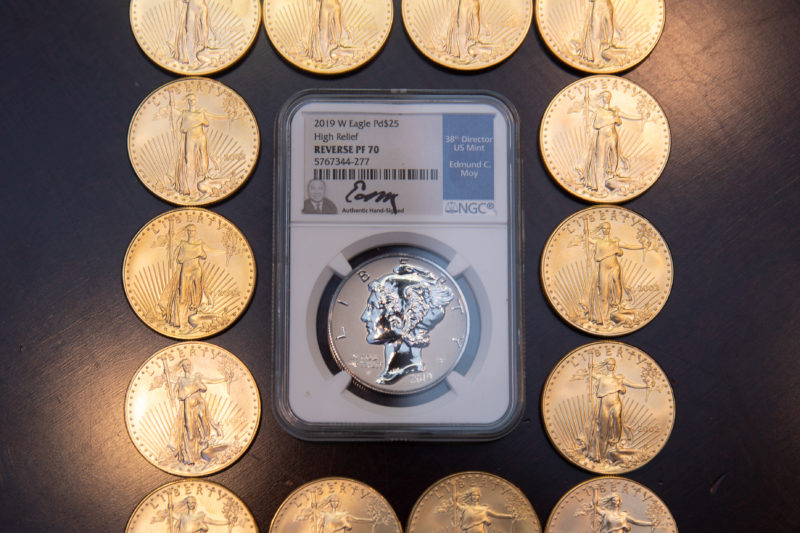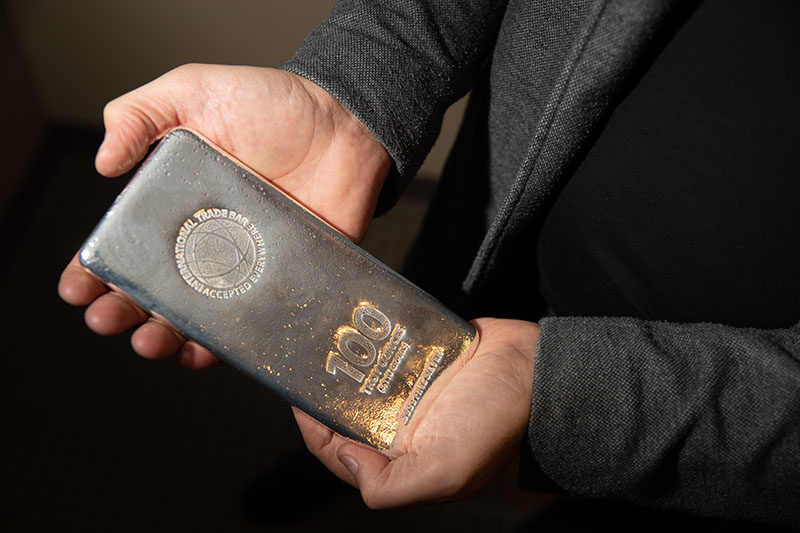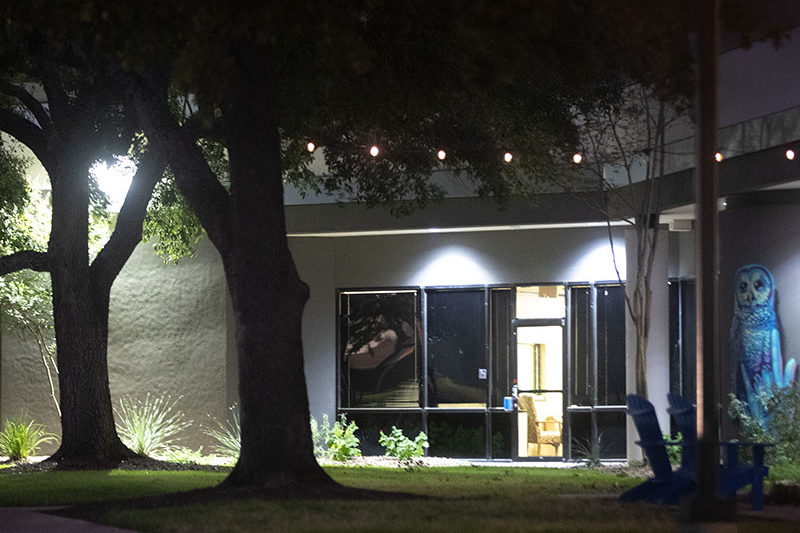Understanding the Constitutional Amendment That Would Exempt Gold from Taxation
By Nataleah Small
Reporting Texas
On Nov. 5, voters will weigh in on Proposition 9, a state constitutional amendment that would exempt metals stored in the Texas Bullion Depository — the only state-backed precious metals depository in the nation — from property taxes.
Some proponents say the exemption might make the depository more attractive to investors and could boost the chances of the depository joining COMEX, the leading marketplace for precious metals. Critics say the proposed amendment is a solution in search of a problem, as no Texas government taxes precious metals.
Reporting Texas has answers to Texans’ pressing golden queries.

Lone Star Tangible Assets, a precious metal storage provider and the managing company for the Texas Bullion Depository, displays a 2019, $25 Palladium American Eagle coin surrounded by 1 ounce gold American Eagle coins at its North Austin office on Oct. 15, 2019. If Proposition 9 is approved by voters on Nov. 5, precious metals stored in the Texas Bullion Depository will be exempt from taxation.
What do proponents say?
Dozens of states have tax exemptions for precious metal deposits written into law, and proponents of Proposition 9 argue that exempting precious metals from property taxes will allow the Texas Bullion Depository to attract more deposits.
Texas law excludes precious metals held by depositors from state sales tax unless they are held for the production of business income, said Tom Smelker, director of treasury operations for the Texas Comptroller’s Office and administrator of the Texas Bullion Depository. However, local taxing authorities still have the option of levying property taxes on precious metals.
“We felt like depositors may not hold their metal in our depository if they can move it to other states that did not have that tax,” Smelker said.
Some proponents also argue that the proposed amendment would increase the chances of the bullion depository joining COMEX. It operates out of New York City.
What do opponents say?

Joshua Hinsdale, the director of public relations for Lone Star Tangible Assets, holds a 100 ounce silver bar at the company’s North Austin office on Oct. 15, 2019. Opponents argue the proposed constitutional amendment is unnecessary because precious metals are currently not taxed in the state. Joshua Guenther/Reporting Texas
Opponents argue that because local taxing authorities do not currently impose property taxes or have plans to impose taxes on precious metals, the constitutional amendment is unnecessary. Opponents also argue that tax breaks provided by the amendment could give preferential treatment to precious metals over other investment options and that the amendment would not impact the Texas Bullion Depository’s chances of joining COMEX.
Matt Ferris, chairman of Lone Star Tangible Assets, the private company Texas tapped to operate the depository, says exempting precious metals from taxation would not allow the depository to become a member of COMEX. Ferris has stated that the depository has not become a member of COMEX due to geography. The eight vaults licensed by COMEX are all within 150 miles of New York City, according to the Texas Comptroller’s website. That proximity means exchanges can happen quickly, boosting liquidity.
How was the Texas Bullion Depository created?
The Texas Legislature voted in 2015 to create a state-administered bullion depository under the purview of the Texas Comptroller’s office. In 2017, The office selected Lonestar Tangible Assets as the private vendor that would operate the facility. The depository opened in North Austin in 2018 and makes money from storage fees on deposits. Any U.S. citizen or resident can open an account at the depository.
Because the facility is part of a state agency, it receives more oversight than a private company, Ferris said. Apart from the Texas depository, the United States Bullion Depository at Fort Knox is the only other government-run bullion depository in the country. A large portion of the nation’s bullions reserves are stored in Fort Knox, but private citizens are unable to use it.
When the depository was established, promises were made, but did they come to pass?
When the bullion depository was established, Gov. Greg Abbott said the facility would allow Texas to “repatriate” the gold supply held by The University of Texas/Texas A&M Investment Company (UTIMCO) from New York to the Lone Star State.
But UTIMCO chose to keep the $690 million of gold it holds at HSBC Bank in New York, said Karen Adler, director of media relations for The University of Texas System.
Adler said that UTIMCO’s fiduciary duty “requires that it ensure best execution and market access across its entire investment portfolio. This requires that any physical gold held in portfolios managed by UTIMCO be stored in a vault that is a robust member of the COMEX (Chicago Mercantile Exchange),” Adler said.
What’s next for the depository?

The Texas Bullion Depository operates out of this North Austin facility managed by Lone Star Tangible Assets. The depository will move to a 40,000-square-foot storage facility in Leander, Texas, in January 2020. “The depository in Leander will have the capacity to store more metal than is currently held in Fort Knox,” said Joshua Hinsdale, director of public relations for Lone Star Tangible Assets. Joshua Guenther/Reporting Texas
The Texas Bullion Depository is currently located in North Austin. It is set to move to a new, larger facility in Leander in January, Ferris said. The new facility is 40,000 square feet and has the potential to store $300 billion in tangible assets. It has the capacity to store more precious metal than does Fort Knox, said Joshua Hinsdale, director of public relations for Lonestar Tangible Assets.
Hinsdale declined to comment on how much gold is stored in the depository. Smelker said the depository hasn’t attracted many large depositors, but he anticipates business will pick up soon.
“This industry goes pretty slow,” Smelker said. “So, I don’t think it will be overnight either. I think it’ll be several years before we get to be a mature depository.”